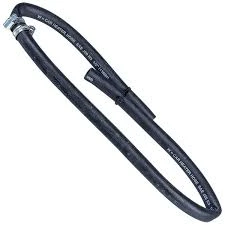Flexible Oil Line Hose for Efficient Fluid Transport and Leak Prevention
វិច្ឆិកា . 29, 2024 13:34 Back to list
Flexible Oil Line Hose for Efficient Fluid Transport and Leak Prevention
Understanding Oil Line Hoses Essential Components for Your Equipment
In the realm of machinery and equipment, particularly in the automotive and industrial sectors, oil line hoses play a crucial role in ensuring smooth and efficient operation. These hoses are specifically designed to transport oil or other fluids, making them vital for the functioning of engines, hydraulic systems, and various types of machinery. This article delves into the significance, types, applications, and maintenance of oil line hoses.
Importance of Oil Line Hoses
Oil line hoses are essential for the delivery and return of lubricant in various machines. They help maintain consistent oil flow, which is critical for lubricating moving parts, cooling components, and preventing wear and tear. The proper functioning of these hoses can greatly affect the performance and longevity of an engine or machine. Any failure in the oil line can lead to severe operational issues, including overheating, increased friction, and ultimately, catastrophic engine failure.
Types of Oil Line Hoses
There are several types of oil line hoses available, each designed for specific applications and environments. The most common types include
1. Rubber Hoses These are widely used due to their flexibility and resistance to oil and heat. They are suitable for low to medium-pressure applications and can be found in various diameters.
2. Braided Hoses These hoses feature a braid of steel or other materials for added strength and pressure tolerance. They are often used in high-pressure applications and provide excellent durability against wear and tear.
3. Thermoplastic Hoses Made from advanced synthetic materials, these hoses are lightweight and resistant to chemical degradation. They are commonly used in environments where traditional rubber hoses might fail due to exposure to harsh chemicals.
4. Stainless Steel Hoses Known for their resilience to extreme temperatures and corrosive fluids, stainless steel hoses are often used in industries that require the highest standards of safety and reliability.
Applications of Oil Line Hoses
Oil line hoses are found in a variety of applications across different industries
. Some common uses include- Automotive In vehicles, oil line hoses are crucial for connecting the oil filter, oil pump, and the engine. They ensure that the engine receives the necessary lubrication to function efficiently.
oil line hose

- Heavy Machinery In construction and agricultural machinery, these hoses are employed in hydraulic systems to transfer hydraulic oil, ensuring the smooth operation of lifts, excavators, and other equipment.
- Marine Boats and ships utilize oil line hoses to transport fuel and oil, essential for their operation, ensuring that engines remain properly lubricated and functioning.
- Industrial In manufacturing, oil line hoses can be used in machinery that requires lubrication to operate efficiently, thereby reducing downtime and maintenance costs.
Maintenance of Oil Line Hoses
Proper maintenance of oil line hoses is essential for preventing leaks and ensuring uninterrupted operation. Here are some tips for maintaining oil line hoses
1. Regular Inspection Check hoses for any signs of wear, cracks, or leaks. Pay attention to areas where hoses bend, as these are often prone to failure.
2. Cleanliness Keep the area around the hoses clean and free from contaminants. Dirt and debris can compromise the integrity of the hose and lead to failure.
3. Proper Installation Ensure that hoses are installed correctly, with no sharp bends or kinks that could restrict flow or cause damage.
4. Temperature Consideration Be mindful of the operating temperature of the hose. Ensure that the hose material is suitable for the temperatures it will be exposed to during operation.
5. Replacement Do not hesitate to replace hoses that show signs of damage or significant wear. It’s a small investment that can save you from costly repairs and downtime later.
Conclusion
Oil line hoses are indispensable in modern machinery and vehicles, facilitating the safe and efficient transport of fluids necessary for operation. Understanding the types, applications, and maintenance of these hoses can lead to better equipment performance and longevity. Proper care and attention to these components can help to avoid breakdowns and ensure that machinery operates at its optimal level. By investing time in maintaining oil line hoses, you can enhance the reliability and efficiency of your equipment, paving the way for smoother operations in any industrial or automotive setting.
